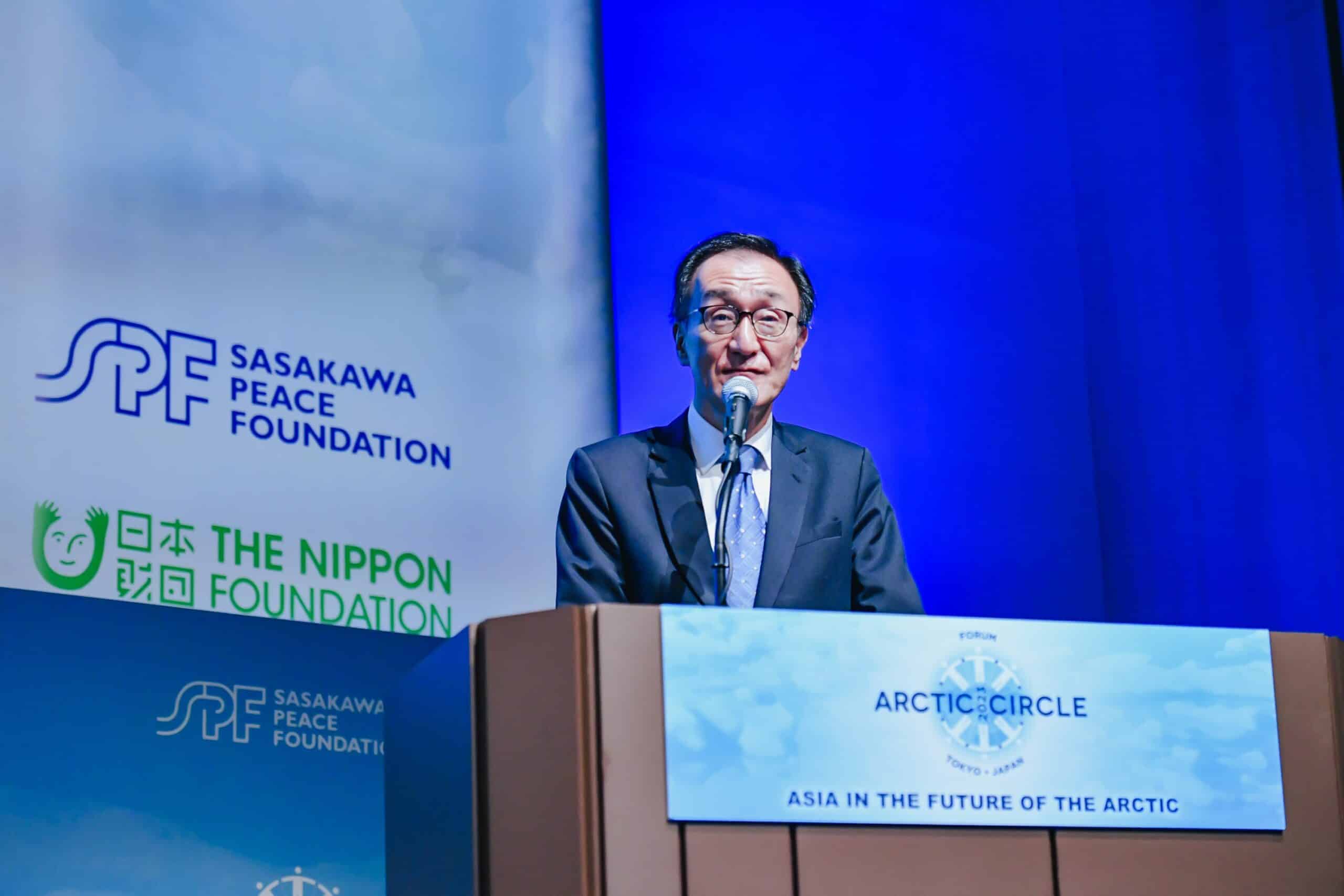Japan Steps Up Its Arctic Engagement

Keizo Takewaka, Ambassador for International Economic Affairs and Arctic Affairs, Ministry of Foreign Affairs of Japan, spoke at the #ArcticCircle2023. Photo: Arctic Circle
Adopted in October 2015, Japan’s Arctic Policy covered a wide range of topics. These included global environmental issues, indigenous peoples of the Arctic, science and technology, the rule of law, the promotion of international cooperation, the Arctic Sea Route, natural resources development, and national security. However, for a more comprehensive understanding of Japan’s engagement with the Arctic, one should look at Japan’s Basic Plan on Ocean Policy. The Plan provides a clearer picture of the evolving thought process behind Japanese policymaking related to the Arctic. The Basic Plan on Ocean Policy is reviewed and updated every five years to ensure its relevance and effectiveness in addressing the evolving maritime issues.
The Arctic first appeared in the Second Basic Plan on Ocean Policy in 2013. This plan outlined three directions for the Arctic: observing and studying the region from a global perspective, increasing international cooperation, and utilizing the Arctic Sea Route. On April 28, 2023, Japan released its fourth version of the Basic Plan on Ocean Policy, which further demonstrated the country’s growing engagement in the Polar North. While the fundamental priorities around research, international cooperation, and sustainable utilization remain consistent across the Second and Third Basic Plan on Ocean Policy, the updated policy reveals meaningful evolutions that showcase Japan assuming a more assertive Arctic identity to match its interests with influence. The latest document is currently not available in English, and this op-ed provides a summary of its main Arctic-related content.
What’s new in Japan’s Arctic Engagement?
The Fourth Basic Plan on Ocean Policy reaffirms Japan’s commitment to (1) enhancing Arctic research capabilities to guide its Arctic-related decisions, (2) fostering international scientific cooperation, and (3) nurturing the next generation of talent to address Arctic issues. It underscores the importance of contributing to international forums such as the Arctic Council, and cooperative frameworks with other Arctic states, to help shape rules and norms. The plan also emphasizes the importance of creating a safe environment for Japanese shipping companies when utilizing the Arctic Sea Route by using satellite data to create sea ice charts, thereby enhancing Arctic navigation safety. It also encourages the Japanese business community’s active participation in international forums such as the Arctic Economic Council and the Arctic Circle to expand Arctic region economic activities, while prioritizing sustainable Arctic resource development and shipping route use. What are the new elements in this updated version?
Research
The latest plan provides more concrete details on developing technologies to strengthen Arctic observation capabilities, including constructing a new ice-breaking research vessel. Scheduled for completion in 2026, the vessel promises unmatched observational capabilities and icebreaking capacity to access remote sections of the Arctic Ocean. Collaborative projects such as the Arctic Challenge for Sustainability Initiative II (ArCS II) are set to not only accelerate discovery and ensure these insights actively shape Japan’s Arctic agenda in real-time, but also develop human resources who can lead international discussions to solve problems in the Arctic.
International cooperation
The fourth version puts more emphasis on adhering to international law principles such as freedom of navigation in the Arctic Ocean, which is aligned with its Free and Open Indo-Pacific Vision. The updated document also reflects recent negotiations culminating in a 2021 legally binding agreement. The agreement, which came into force in June 2021, bans unregulated fishing in Central Arctic Ocean international waters. As an active participant in these talks since 2015, Japan strictly adheres to this treaty on sustainable fisheries management regimen. This approach balances imminent economic opportunity with long-term conservation needs in the face of warming, acidic waters, and shifting fish stocks.
Sustainable utilization
The area of sustainable utilization is particularly exciting as it features the most updated elements in the plan’s fourth version. While it does not address specific natural, technical, institutional, and economic issues related to the route as its predecessors, it provides more detailed strategies to support Japanese shipping companies in utilizing the Arctic Sea Route. This includes (1) collecting information on the Arctic region and the Arctic Sea Route, and (2) fostering cooperation between industry, academia, and government, with an emphasis on information sharing. The plan also prioritizes climate change mitigation and Arctic environmental conservation, which is in line with the “Long-Term Strategy for Growth Based on the Paris Agreement” and the “Plan for Global Warming Countermeasures.”
Conclusion
The Fourth Basic Plan on Ocean Policy reveals a notably more proactive, assertive, and ambitious tone across the main pillars of research, international cooperation, and sustainable utilization than its predecessors. In particular, with the fourth version further empowering sustainable utilization, Japan cements itself as an engaged steward rather than a bystander across Arctic development to set the standard for the entire region. This nuance shows Japan’s pragmatic understanding of the complex dynamics shaping the 21st-century Arctic amid climate change and internationalization.
In an age of climate crisis and growing great power competition, Japan faces increasing incentives to engage itself across the Arctic region’s research, governance, and emerging commerce landscape. As demonstrated in the fourth version, the country asserts itself as an essential partner in stewarding and studying this vital region alongside fellow concerned nations. Both international collaboration and domestic coordination are key vehicles for Japan to match its ambitions with its capabilities in an increasingly busy Polar North.
Khang Pham is a Master’s candidate in International Relations at the Graduate School of Asia-Pacific Studies, Waseda University, Japan. Pham’s research is centered around Climate Security with a regional focus on Asia-Pacific and the Arctic.